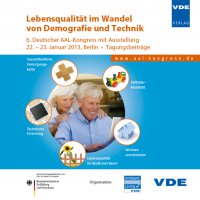PASSAge - Personalized Mobility, Assistance and Service Systems in an Ageing Society
Conference: Lebensqualität im Wandel von Demografie und Technik - 6. Deutscher AAL-Kongress mit Ausstellung
01/22/2013 - 01/23/2013 at Berlin, Deutschland
Proceedings: Lebensqualität im Wandel von Demografie und Technik
Pages: 10Language: englishTyp: PDF
Personal VDE Members are entitled to a 10% discount on this title
Authors:
Bähr, Matthias; Kranz, Matthias (Citysax Mobility GmbH, Dresden, Germany)
Klein, Sarah; Linner, Thomas; Bock, Thomas (Technische Universität München, Chair for Building Realization and Robotics, Munich, Germany)
Diewald, Stefan; Roalter, Luis (Technische Universität München, Distributed Multimodal Information Processing Group, Munich, Germany)
Haag, Claus (Haag Rehatechnik GmbH & Co. KG, Kronau, Germany)
Hofstetter, Gebhard (Sunrise Medical GmbH & Co. KG, Malsch, Germany)
Khoury, Maher (HMM Diagnostics GmbH, Dossenheim, Germany)
Kurz, Daniel (metaio GmbH, Munich, Germany)
Winkler, Andreas; König, Andrea; Holzer, Nadine (SOPHIA mit P.S. Südbayern gGmbH, Holzkirchen, Germany)
Siegrist, Monika; Pressler, Axel (Technische Universität München, Department for Prevention, Rehabilitation and Sports Medicine, Munich, Germany)
Heuberger, Matthias; Wessig, Kerstin (Ludwig-Maximilians-Universität München, Generation Research Program, Bad Tölz, Germany)
Abstract:
The demographic change in modern societies has a significant impact on the future planning of self-determined mobility and mobility means. An optimized accessibility of the means of transportation is required, as well as their connection towards buildings and residences. These connections have to be modular and compatible to the mobility means of the users. Barrier-free accessibility according to the existing norms can address these problems only partially. Broader and holistic concepts are needed here. The project PASSAge aims at the implementation of seamless mobility chains that smoothly connect private and public space. Mobility shall be ensured by the extension of existing mobility means with user-oriented components. The project follows the approach to complement the barrier-free access and usage of public transportation with mostly electrically powered compact vehicles and micro vehicles. These have to be adapted by physical means and information technology means to residences and building structures. Core of the project is to develop a flexible socio-technical infrastructure with a multitude of mobility means and modular buildings, thus creating synergy effects. An important goal of the approach is the development of business models, which allow for and ensure the allocation and coordination of mobility services. Interfaces will be created for all compact vehicles and micro vehicles that extend their functionality both digitally and physically and thereby enable their ubiquitous connection to the envisioned services.


